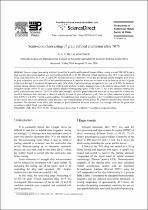JavaScript is disabled for your browser. Some features of this site may not work without it.
- ResearchSpace
- →
- Research Publications/Outputs
- →
- Journal Articles
- →
- View Item
| dc.contributor.author |
Curle, UA

|
|
| dc.contributor.author |
Govender, G

|
|
| dc.date.accessioned | 2010-09-28T14:54:03Z | |
| dc.date.available | 2010-09-28T14:54:03Z | |
| dc.date.issued | 2010-09 | |
| dc.identifier.citation | Curle, UA and Govender, G. 2010. Semi-solid rheocasting of grain refined aluminum alloy 7075. Transactions of Nonferrous Metals Society of China, Vol. 20(3), pp 832-836 | en |
| dc.identifier.issn | 1003-6326 | |
| dc.identifier.uri | http://hdl.handle.net/10204/4393 | |
| dc.description | Copyright: 1997-2008 Editorial office of Transactions of Nonferrous Metals Society of China | en |
| dc.description.abstract | Near-net shape rheocasting with the Council for Scientific and Industrial Research Rheo casting system(CSIR–RCS) and a high pressure die casting machine was successfully performed on Al–5Ti–1B grain refined aluminum alloy 7075. Grain refinement levels used were 0.03% Ti, 0.13% Ti and 0.29% Ti (mass fraction). Tensile tests reveal that the ultimate tensile strengths, at all levels of grain refinement, are at least 97% of the specified minimum. Elongation at fracture increases with the increase of level of grain refinement although a maximum elongation is only 76% of the required minimum elongation in the case of 0.29% Ti. Incipient melting, during solution treatment, of the low melting point multinary eutectic causes porosity in the material and accounts for poor elongation results. 0.03% Ti has a coarse eutectic structure forming larger pores while 0.29% Ti has a fine structure forming fine pores in the multinary eutectic. The 0.2% offset yield strengths of all the grain refinement levels are at least equal to or above the specified minimum and a decrease is observed with the increase of grain refinement level. There is a clear reduction in grain size from 0.03% Ti to 0.29% Ti in the as-cast condition. An underlying grain structure develops in the T6 condition material which has an inverse size to the as-cast structure; coarse grained as-cast material results in fine grained T6 condition material after solution heat treatment. The decrease in the offset yield strength as grain refinement increases correlates very strongly with the T6 grain sizes according to a Hall–Petch type relationship. | en |
| dc.language.iso | en | en |
| dc.publisher | Editorial office of Transactions of Nonferrous Metals Society of China | en |
| dc.subject | High pressure die casting | en |
| dc.subject | F condition | en |
| dc.subject | T6 condition | en |
| dc.subject | Incipient melting | en |
| dc.subject | Grain refined aluminum alloy | en |
| dc.subject | Nonferrous metals | en |
| dc.title | Semi-solid rheocasting of grain refined aluminum alloy 7075 | en |
| dc.type | Article | en |
| dc.identifier.apacitation | Curle, U., & Govender, G. (2010). Semi-solid rheocasting of grain refined aluminum alloy 7075. http://hdl.handle.net/10204/4393 | en_ZA |
| dc.identifier.chicagocitation | Curle, UA, and G Govender "Semi-solid rheocasting of grain refined aluminum alloy 7075." (2010) http://hdl.handle.net/10204/4393 | en_ZA |
| dc.identifier.vancouvercitation | Curle U, Govender G. Semi-solid rheocasting of grain refined aluminum alloy 7075. 2010; http://hdl.handle.net/10204/4393. | en_ZA |
| dc.identifier.ris | TY - Article AU - Curle, UA AU - Govender, G AB - Near-net shape rheocasting with the Council for Scientific and Industrial Research Rheo casting system(CSIR–RCS) and a high pressure die casting machine was successfully performed on Al–5Ti–1B grain refined aluminum alloy 7075. Grain refinement levels used were 0.03% Ti, 0.13% Ti and 0.29% Ti (mass fraction). Tensile tests reveal that the ultimate tensile strengths, at all levels of grain refinement, are at least 97% of the specified minimum. Elongation at fracture increases with the increase of level of grain refinement although a maximum elongation is only 76% of the required minimum elongation in the case of 0.29% Ti. Incipient melting, during solution treatment, of the low melting point multinary eutectic causes porosity in the material and accounts for poor elongation results. 0.03% Ti has a coarse eutectic structure forming larger pores while 0.29% Ti has a fine structure forming fine pores in the multinary eutectic. The 0.2% offset yield strengths of all the grain refinement levels are at least equal to or above the specified minimum and a decrease is observed with the increase of grain refinement level. There is a clear reduction in grain size from 0.03% Ti to 0.29% Ti in the as-cast condition. An underlying grain structure develops in the T6 condition material which has an inverse size to the as-cast structure; coarse grained as-cast material results in fine grained T6 condition material after solution heat treatment. The decrease in the offset yield strength as grain refinement increases correlates very strongly with the T6 grain sizes according to a Hall–Petch type relationship. DA - 2010-09 DB - ResearchSpace DP - CSIR KW - High pressure die casting KW - F condition KW - T6 condition KW - Incipient melting KW - Grain refined aluminum alloy KW - Nonferrous metals LK - https://researchspace.csir.co.za PY - 2010 SM - 1003-6326 T1 - Semi-solid rheocasting of grain refined aluminum alloy 7075 TI - Semi-solid rheocasting of grain refined aluminum alloy 7075 UR - http://hdl.handle.net/10204/4393 ER - | en_ZA |






